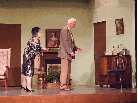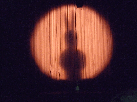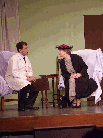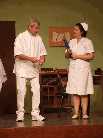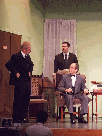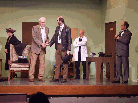|
Harvey by Mary Chase - directed by Andy Millward
Critic's Comments:-
"Phoenix has never baulked at difficult plays, and director Andy Millward has pulled off something of a triumph with the marvellously written Harvey, about a pleasantly deluded drunk with an imaginary rabbit.
He kept the cast to the point and told the story in an unambiguous and sensitive way, working well to get the laughter lines across while not avoiding the social comment of attitudes to mental illness.
Key character is Elwood Dowd, the easy-going drunk stumbling his unconcerned way through the machinations of his sister, who wants him sectioned. The part was perfect for Syd Smith, who ambled amiably through with the character acting and comic timing of a picked W. C. Fields.
The sister out to make a name for herself in society was played by Helen Langley with style and understanding. Her comic moments were fewer but well worth waiting for.
Two of the key cameo parts are those of the psychiatrist, played with terse urgency by Chris Wright, and the even more terse judge, played by Reg Peters.
A manic Geoff Hadley bravely man-handled anyone needing incarcerating, and a casting pair of real genius was the nurse (Leila Francis) and the up-and-coming psychiatrist (Neil Smith) who between them kept up a superb dialogue which made the play for me.
Some negatives: The set was supposed to depict a domestic library, but instead was a bare-walled enclosure with the obligatory door that wouldn't close. And while the whole cast worked well to build up an atmosphere of a relaxed, easy-going comedy of errors, someone taking flash photographs on the first night did his best to ruin it."
Jim Hutchon-Weekly News
---------------------
"Harvey is an enigmatic play in which the main character Elllwood P Dowd claims to travel around with a six foot three and half inch white rabbit, named Harvey. Although clearly a comedy with some wonderfully funny lines there are also some steely undercurrents: of selfishness, as manifest in the behaviour of Myrtle Mae and Veta Louise Simmons (Dowd's sister) and intolerance, as shown by Dr Sanderson. As an audience we warm to the old world courtesy and harmless innocence of Dowd, who is well played by Syd Smith, but we also have doubts about his sanity and his culpability, given the ambiguity as to whether excessive drinking (which he could control) or a psychiatric disorder (which he could not control) are at the root of his hallucinations. A further ambiguity is introduced when Dr Chumley appears to believe in Harvey and Marvin Wilson reads a personal comment to himself in an encyclopedia reference to a pooka, a Celtic spirit in animal form which Dowd claims Harvey is. Phantom door openings increase the audience's speculation surrounding Harvey's existence as real or a figment of Dowd's imagination. In one sense the existence or not of Harvey becomes irrelevant as the plot is overtaken by redemption for all when the taxi driver demands his fare, claiming that his passengers are perfectly lovely on the way to the clinic but perfect bastards after their so called cure. This triggers the realisation in Veta that she would rather live with her brother happy go lucky but believing in a harmless fantasy than being "a perfect bastard" and having nothing to believe in at all.
The play is perhaps a little difficult to convey at every level but is relatively easy to do as a straight comedy. In this respect Dowd and Veta Louis Simmons get the acting honours since theirs are the roles that delivered the best lines and in the right way. In fact, this may have been the best part that I have seen Helen Langley (Simmons) play, delivering both a flawless American accent as well as a convincing mother and sister to Myrtle Mae and Dowd respectively, with emotions ranging from frustration to anguish and guilt. The best scene in the play was Simmons' return from the clinic and her description of her treatment at the hands of the brutish nurse Marvin Wilson. Accents, while not essential, can help enormously with characterisation. Generally most of the actors struggled with the American accent, it being almost absent, variable or too far west. The notable exception was Dr Sanderson, played by Neil Smith, who was both fluent and convincing. I found the accents distracting at best and disturbing at worst. There were also a few costume issues which I found unhelpful and possibly impacting the actors' perception of themselves. Myrtle Mae Simmons' blonde wig was far too severe and did not seem to fit well. Marvin Wilson's trainers and white costume seemed to imbue him with an athletic and perhaps over-active persona that should perhaps have been more subservient and restrained, in my view. Finally, Judge Gaffney's suit should perhaps have been black, more in keeping with the sobriety and upright nature of the stereotype. A simple costume change may have curbed the tendency towards speaking with a Texas drawl rather than the East Coast aristo he should probably have been."
Stewart Adkins-National Operatic and Dramatic Association
Return to top
|
|


